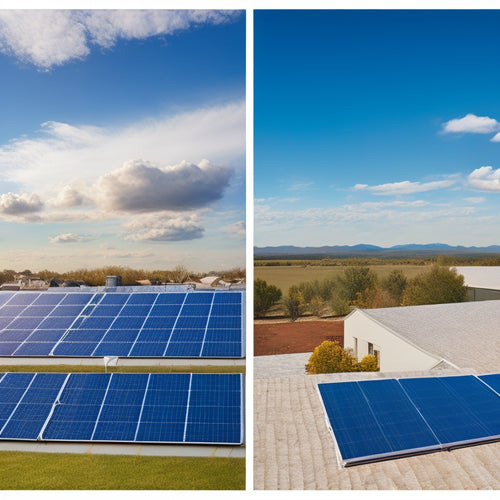
Best Commercial Solar Systems for Business
Share
When choosing the best commercial solar system for your business, you'll want to focus on high-efficiency solar panels from top brands, ideally configuring the system to match your energy usage patterns and available space. You should also consider energy storage options to reduce grid reliance and guarantee backup power during outages. A quality installation and regular maintenance are essential for efficiency and safety. Additionally, you'll need to weigh upfront costs against potential returns, including tax credits and state incentives. By considering these key factors, you can create a customized solution that maximizes your investment's potential and sets your business up for long-term success - and there's more to investigate on this topic.
Key Takeaways
- High-quality solar panels with high-efficiency rates (above 20%) ensure maximum energy production and reduced installation costs.
- Proper system size and configuration, considering roof space, energy usage, and local building codes, optimize energy generation and grid integration.
- Energy storage options, such as lithium-ion and lead-acid batteries, help reduce grid reliance and provide backup power during outages.
- Quality installation and regular maintenance by a reputable installer are crucial for efficiency, safety, and longevity of the system.
- A comprehensive cost and ROI analysis, including financing options, tax credits, and state incentives, determines the feasibility and profitability of the investment.
Top Solar Panel Brands
What makes a solar panel brand stand out from the rest? When selecting a commercial solar system, you need to take into account the top solar panel brands that offer high-quality products and exceptional performance. A brand's reputation is vital, as it reflects their commitment to providing reliable and efficient solar panels.
Look for brands with a proven track record of producing high-efficiency solar panels, which can greatly impact your system's overall energy output. Solar panel efficiency is an essential factor to evaluate, as it directly affects the amount of energy your system can generate.
Top brands typically offer high-efficiency solar panels, often exceeding 20% efficiency rates. This means more power per unit area, resulting in a smaller system footprint and reduced installation costs.
Additionally, reputable brands often provide extensive warranties, safeguarding your investment for years to come. By choosing a top solar panel brand, you can guarantee your commercial solar system operates at its best, providing a reliable source of clean energy and maximizing your return on investment.
System Size and Configuration
As you investigate the specifics of your commercial solar system, determining the ideal system size and configuration is crucial to maximize energy output and minimize costs.
You'll need to take into account factors like your business's energy usage patterns, available roof or land space, and local building codes. A properly sized system guarantees you're generating enough power to meet your energy needs while avoiding oversizing, which can increase upfront costs.
When configuring your system, you'll want to enhance system efficiency by selecting the right combination of solar panels, inverters, and mounting hardware.
This includes choosing the most efficient panels for your budget and verifying they're installed at the best angle and orientation.
You'll also need to factor in grid integration, including the type of inverter and grid connection required to synchronize with the utility grid.
A well-designed system will seamlessly integrate with the grid, allowing you to sell excess energy back to the utility company and offset your energy bills.
Energy Storage Options
Several commercial solar systems now incorporate energy storage options to optimize energy usage and reduce reliance on the grid. You can choose from various battery technologies, each with its advantages and disadvantages.
Lithium-ion batteries, for instance, offer high energy density and long lifetimes, while lead-acid batteries provide a more cost-effective solution.
When selecting an energy storage system, you should evaluate your business's specific needs and goals. If you want to reduce peak demand charges, you'll need a system that can discharge energy during peak hours. If you're looking to provide backup power during outages, you'll need a system with a high capacity and long duration.
Grid integration is also a significant aspect to assess. You'll need to verify that your energy storage system can seamlessly interact with the grid, feeding excess energy back into the system and drawing power when needed.
A well-designed energy storage system can help you maximize your solar investment, reduce energy costs, and increase your business's resilience. By understanding your options and choosing the right system, you can reveal the full potential of your commercial solar installation.
Installation and Maintenance
Your energy storage system is only as good as its installation and maintenance. A poorly installed system can lead to reduced efficiency, safety hazards, and even complete system failure.
When selecting a commercial solar system, it's vital to work with a reputable installer who'll conduct a thorough site assessment to determine the ideal system design and configuration for your business.
During the installation process, verify that your installer follows industry best practices and adheres to local building codes and regulations. A well-planned installation will minimize downtime, reduce the risk of errors, and guarantee a smooth shift to renewable energy.
Regular maintenance is also important to optimize system performance and extend its lifespan. Your installer should provide routine maintenance schedules, monitoring, and troubleshooting to identify and address any issues promptly.
Cost and ROI Analysis
When evaluating commercial solar systems, calculating the cost and ROI analysis is essential to determine the feasibility and profitability of your investment.
You need to take into account the upfront costs, including the system's purchase price, installation, and maintenance expenses. However, with the right financing options, you can mitigate these costs and spread them out over time.
Tax incentives, such as the Solar Investment Tax Credit (ITC), can also greatly reduce your expenses. The ITC allows you to claim a tax credit of up to 26% of the total system cost, providing a substantial return on your investment.
Additionally, many states offer additional incentives, such as rebates and grants, that can further decrease your costs.
Frequently Asked Questions
Can I Install Solar Panels on a Leased or Rented Property?
You can install solar panels on a leased or rented property, but you'll need to negotiate solar panel leases and tenant agreements that outline terms, responsibilities, and benefits, ensuring a mutually beneficial arrangement for both you and the property owner.
Are There Any Tax Credits for Non-Profit Organizations?
You'll be interested to know that 66% of non-profits have reduced energy costs in mind; now, regarding tax credits, you'll be eligible for a 30% investment tax credit, claiming it as a direct rebate, as non-profit organizations can pass the tax benefits to their investors.
Do Solar Panels Increase My Property Insurance Rates?
You wonder if solar panels increase your property insurance rates. Typically, they don't, but it depends on your insurance policy. The solar panel impact is often considered a business asset, so you might need to adjust your policy to cover the added value.
Can I Use Solar Panels to Power My Electric Vehicle?
As you drive into the future, you're wondering if solar panels can fuel your electric vehicle. The answer is yes, you can capture solar power for solar charging, providing a clean and sustainable energy source to power your EV's expedition.
Are There Any Specific Solar Panel Warranties for Commercial Use?
You'll find that different solar panel types offer varying warranty coverage for commercial use, typically ranging from 25 to 30 years, with some manufacturers providing extended warranties for specific components or performance guarantees.
Related Posts
-

Top 10 Tips for Buying Car Accessories Online
When purchasing car accessories online, you should take proactive steps to avoid low-quality or incompatible products...
-

Why Cities Need Smart Charging Infrastructure Now
You're about to experience a tidal wave of electric vehicles hitting your city's streets, and it's essential you're p...
-

Tracking Solar Panels Vs Fixed Panels Cost Savings
When considering solar panel options, you'll want to weigh the cost savings of tracking solar panels versus fixed pan...


